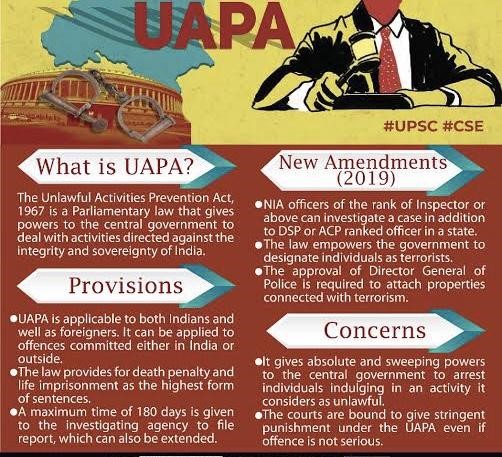Ahmedabad
(Head Office)Address : 506, 3rd EYE THREE (III), Opp. Induben Khakhrawala, Girish Cold Drink Cross Road, CG Road, Navrangpura, Ahmedabad, 380009.
Mobile : 8469231587 / 9586028957
Telephone : 079-40098991
E-mail: dics.upsc@gmail.com

UAPA
News: Recently, The Government of India has declared ‘Jamaat-e-Islami Jammu Kashmir’ as an ‘Unlawful Association’.
Background:
• The outfit was earlier declared an ‘Unlawful Association’ in 2019 and it has been declared unlawful for a further period of 5 years under Section 3(1) of the Unlawful Activities (Prevention) Act (UAPA) 1967.
What is Unlawful Activities Prevention Act (UAPA)?
• The Unlawful Activities Prevention Act (UAPA) is an Indian law enacted in 1967. Its primary objective is to prevent and deal with certain unlawful activities conducted by individuals and associations within India.
• In 2004, the Act was amended for the first time, with “and for dealing with terrorist activities” added to its title.
• In 2012, the UAPA was further amended to include “economic security” of the country in the ambit of terrorism.
• The 2019 amendment gave the government the powers to designate an individual as a terrorist. Until then, only organizations could be designated as “terrorist”.
Criticisms faced by UAPA:
Restriction of Personal Liberty
• Recently, the Jammu and Kashmir High Court highlighted issues related to personal liberty and the application of the UAPA. In the case of journalist Fahad Shah, the court emphasized the need for circumspection in enforcing antiterror laws that allow vast interference with personal liberty.
• The court raised concerns about Section 43-D (5) of the UAPA, which restricts bail if accusations are deemed ‘prima facie true.’
• It rejected the government’s argument that publishing an article could be considered an act of terror and underscored that the UAPA should not extend to punishing alleged defamation of the country
High Arrest Rate, Low Convictions
• The UAPA has been indiscriminately used in recent years to charge human rights activists, journalists, students, workers, and tribals.
• Shockingly, the prosecution success rate under the UAPA is abysmally low. According to a report, less than 3% of arrests made under the UAPA resulted in convictions between 2015 and 2020
• Only a fraction of those detained received bail during this period.
Misuse and Stifling Dissent
• Critics argue that the UAPA has become a political weapon rather than a tool for countering terrorism.
• Scores of journalists, activists, and students have been booked under the UAPA, leading to widespread criticism.
• The law has made it harder for the accused to obtain bail, and there are allegations of misuse by the government to stifle dissent and target minorities
Preventive Detention and Lack of Evidence
• The UAPA enables preventive detention of individuals suspected of unlawful activities, even in cases lacking sufficient evidence for formal trials.
• While preventive measures are crucial for national security, the balance between security and individual rights remains a contentious issue.

Address : 506, 3rd EYE THREE (III), Opp. Induben Khakhrawala, Girish Cold Drink Cross Road, CG Road, Navrangpura, Ahmedabad, 380009.
Mobile : 8469231587 / 9586028957
Telephone : 079-40098991
E-mail: dics.upsc@gmail.com
Address: A-306, The Landmark, Urjanagar-1, Opp. Spicy Street, Kudasan – Por Road, Kudasan, Gandhinagar – 382421
Mobile : 9723832444 / 9723932444
E-mail: dics.gnagar@gmail.com
Address: 2nd Floor, 9 Shivali Society, L&T Circle, opp. Ratri Bazar, Karelibaugh, Vadodara, 390018
Mobile : 9725692037 / 9725692054
E-mail: dics.vadodara@gmail.com
Address: 403, Raj Victoria, Opp. Pal Walkway, Near Galaxy Circle, Pal, Surat-394510
Mobile : 8401031583 / 8401031587
E-mail: dics.surat@gmail.com
Address: 303,305 K 158 Complex Above Magson, Sindhubhavan Road Ahmedabad-380059
Mobile : 9974751177 / 8469231587
E-mail: dicssbr@gmail.com
Address: 57/17, 2nd Floor, Old Rajinder Nagar Market, Bada Bazaar Marg, Delhi-60
Mobile : 9104830862 / 9104830865
E-mail: dics.newdelhi@gmail.com